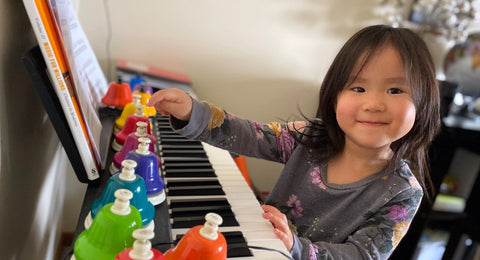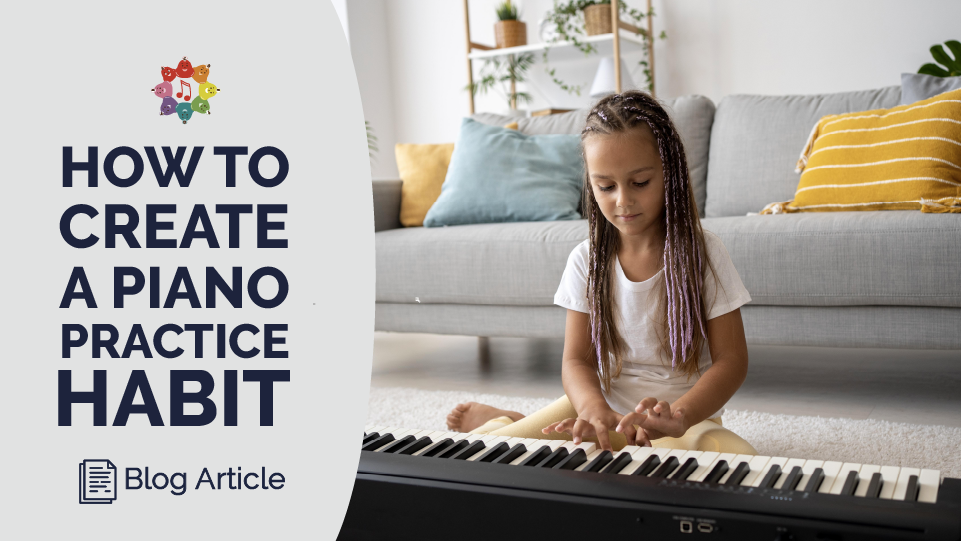Practice creates exceptional musicians. While most people know that practice is necessary to achieve expertise, it’s very easy to assume that our natural talent and passion will fill in the gaps. The reality is that even the best musicians in the world practice for hours daily after reaching their career peaks. No musician is excused from the need to practice.
Finding the time, drive, willpower and quiet space to practice can be challenging. It takes commitment to be diligent and consistent. Ultimately, self-regulation is needed in order for students to reach their goals. Using proven tips for staying on track with piano practice can make the journey satisfying. Take a look at seven self-regulating tips for successful piano practicing!
1. Practice Right After a Lesson

There can be a sense of “shaking off” the difficulty of a lesson once a student is done. This is a very common error to fall into as a newer piano student. The reality is that abandoning “piano mode” right after practice makes it more likely that a person won’t actually practice at all.
The best time to practice the piano is right after getting home from a lesson. Yes, letting a few hours go by to have dinner, take care of homework, or see the family is fine. However, fitting practice in while the lesson is still fresh is one of the secrets to having a successful practice session. Knocking practice off your to-do list as early as possible reduces the anxiety surrounding your need to practice. You can then move on with the other things you need to do without the looming stress of needing to fit in a practice. In addition to making your life easier, this helps to eliminate any negative associations you may tie to the “task” of practicing.
It’s also important that you don’t wipe practicing from the board just because you got in one good practice after a lesson. Fitting a practice in on the second day after a lesson is a great way to reinforce what you’ve learned. These two back-to-back practice sessions will help to set you up for a better lesson!
2. Be Consistent With Practice Times
“Behavioral scientists suggest that we need to create a routine that weaves our new desired behavior into our daily lives to increase repetition so that it may one day become a default response and thus a habit,” shares Rob Jardin, Head of Research and Solutions at the NeuroLeadership Institute South Africa. You can see why it’s so important to be rigid about practice times. First, this helps you to know exactly where practice fits into your schedule every single day. As a result, you’re less likely to put off practicing until you’re too tired, busy, or unmotivated at the end of a long day. There’s also another benefit.
Establishing a set practice time creates a boundary with other people in your household. When you practice at erratic times, your household can’t anticipate when you need quiet time. Members of your household may also make plans that end up dragging you away from your piano for too long when you should be practicing. A set practice time that you adhere to every single day allows you to orient your schedule around practice instead of desperately trying to shoehorn practice into a packed schedule. It’s also fair to members of your household to ask for quiet at a specific and predictable time every single day instead of expecting them to conform to your whim whenever you feel like practicing!
3. Set Practice Alarms

Use external stimulation to be reminded of practice times! Some people prefer to simply set alarms for practice times. Others will program smart systems like Siri or Alexa to give them voice reminders when it’s time to get on the piano bench. It can be all too easy to ignore the internal monologue that says we need to start practicing. Alarms and alerts are great for creating external sensory reminders that cannot be ignored.
4. Create the Right Environment for Practice

Many people suffering from distractions, frustrations, and lack of inspiration when trying to practice the piano are actually suffering from poor practice environments. Yes, the wrong space can actually make it harder to play. What’s more, you may not even be aware on a conscious level that you are setting up barriers to good practice sessions on the subconscious level. Here’s a look at the common environmental factors that make practicing harder than it should be:
- Not warming up your mind before a practice season. Are you oiling the gears by listening to classical music throughout the day? Put on some classical music at least 15 to 30 minutes before the start of your practice time to get your brain primed for some piano playing.
- Having an audience. Unfortunately, trying to practice when family or friends happen to be in the same room can make a practice session choppy. First, other people can distract you. They can also make you feel self-conscious about playing. Most people practice successfully in private.
- Not having dedicated practice space. This one can be difficult if you don’t have lots of extra space in your home. Try to place your piano in an area of the home that allows you to be alone. You can even consider using curtains or barriers to create a designated practice space. In addition to blocking out noise and activity, practicing in a blocked-off space can simply help you to get in the right mindset.
- Placing temptations near the piano. Is your piano located near a television, gaming system or computer desk? Try to eliminate any distractions that could cause you to daydream about doing something else while you’re practicing.
It’s not always possible to control your environment when you live with other people. However, it’s important to consider having a conversation about moving a piano to another area, reserving a room in your home at a certain time each night, or putting up some barriers. The good news is that you do have control over how accessible you make things like phones and laptops during practice! Focus on eliminating these two big distractions even if you can’t control much else about what goes on in your home.
5. Write Down Your Goals

It’s so easy to forget why we started something when things get hard. Many people begin a journey with a musical instrument with visions of sitting on a stage in front of a packed audience. However, the reality is that 99 percent of any musician’s relationship with an instrument is spent alone with nothing more than determination pushing you forward. These are the times when it’s hard to remember why you started.
This is where writing down your goals can be helpful for staying motivated to practice. Place the goals in a spot that’s visible while you practice. It can be helpful to start with smaller goals that you can “check off” when you get to them. This will provide encouragement that helps you to keep going when your bigger goals seem far off.
6. Keep a Practice Log

Accountability is so important for self-regulation. Create a practice log that you sign off on after every single practice to build accountability into your routine. You should record the date, time, and duration of each practice session. The reason for the log is simple. It’s all too easy to let skipped days pile up if we’re not keeping records. What’s more, we can convince ourselves that we’re practicing more than we actually are. Many budding musicians find that it’s actually very satisfying to watch their abilities trend upward along with increases in practice times.
7. Use Mantras

Mantras can be great for staying motivated when everything inside you is screaming to take the “easy way out.” Every musician can create personal mantras that address the specific goals, insecurities, or hurdles they are dealing with. You can also borrow some prewritten mantras that are easy to cling to when you need inspiration in a snap. Here are some mantras to consider:
- “I will relax after piano practice.”
- “I will not go more than two days without practicing.”
- “I am not afraid of feeling bored.”
- “I know how to stay motivated.”
The point isn’t to view practicing as a punishment. These mantras are designed to help you recall your own strength and determination. After all, you’re really fighting against the limitations that you’re placing on yourself when it feels like you’re battling the piano on those days when practice is hard!
Final Thoughts on Perfecting Practice Habits

Many people go into new pursuits with goals in mind. However, focusing on habits over goals is actually the secret to achieving goals! Self-regulation tools allow you to take the pain out of practice by forming habits that eliminate the need to “talk yourself into” practicing! Enroll in a Prodigies plan today to begin the journey to self-discovery that is musicianship!



